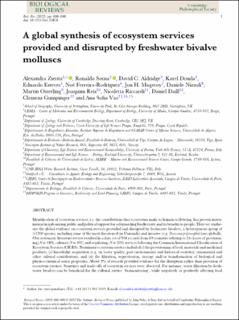A global synthesis of ecosystem services provided and disrupted by freshwater bivalvemolluscs
Zieritz, Alexandra; Sousa, Ronaldo; Aldridge, David C.; Douda, Karel; Esteves, Eduardo; Ferreira-Rodríguez, Noé; Magerøy, Jon Hamner; Nizzoli, Daniele; Österling, Martin; Reis, Joaquim; Riccardi, Nicoletta; Daill, Daniel; Gumpinger, Clemens; Vaz, Ana Sofia
Peer reviewed, Journal article
Published version

Åpne
Permanent lenke
https://hdl.handle.net/11250/3002763Utgivelsesdato
2022Metadata
Vis full innførselSamlinger
- Publikasjoner fra CRIStin - NINA [2364]
- Scientific publications [1392]
Originalversjon
10.1111/brv.12878Sammendrag
Identification of ecosystem services, i.e. the contributions that ecosystems make to human well-being, has proven instru-mental in galvanising public and political support for safeguarding biodiversity and its benefits to people. Here we synthe-sise the global evidence on ecosystem services provided and disrupted by freshwater bivalves, a heterogenous group of>1200 species, including some of the most threatened (in Unionida) and invasive (e.g.Dreissena polymorpha) taxa globally.Our systematic literature review resulted in a data set of 904 records from 69 countries relating to 24 classes of provision-ing (N=189), cultural (N=491) and regulating (N=224) services following the Common International Classification ofEcosystem Services (CICES). Prominent ecosystem services included (i) the provisioning of food, materials and medicinalproducts, (ii) knowledge acquisition (e.g. on water quality, past environments and historical societies), ornamental andother cultural contributions, and (iii) thefiltration, sequestration, storage and/or transformation of biological andphysico-chemical water properties. About 9% of records provided evidence for the disruption rather than provision ofecosystem services. Synergies and trade-offs of ecosystem services were observed. For instance, waterfiltration by fresh-water bivalves can be beneficial for the cultural service‘biomonitoring’, while negatively or positively affecting food consumption or human recreation. Our evidence base spanned a total of 91 genera and 191 species, dominated byUnionida (55% of records, 76% of species), Veneroida (21 and 9%, respectively; mainlyCorbiculaspp.) and Myoida(20 and 4%, respectively; mainlyDreissenaspp.). About one third of records, predominantly from Europe and the Amer-icas, related to species that were non-native to the country of study. The majority of records originated from Asia (35%),with available evidence for 23 CICES classes, as well as Europe (29%) and North America (23%), where research waslargely focused on‘biomonitoring’. Whilst the earliest record (from 1949) originated from North America, since 2000,annual output of records has increased rapidly in Asia and Europe. Future research should focus onfilling gaps in knowl-edge in lesser-studied regions, including Africa and South America, and should look to provide a quantitative valuation ofthe socio-economic costs and benefits of ecosystem services shaped by freshwater bivalves.Key words: biofiltration, biomonitoring,Corbicula, cultural services,Dreissena, ecosystem services, freshwater mussels, pro-visioning services, regulating services, Unionida
